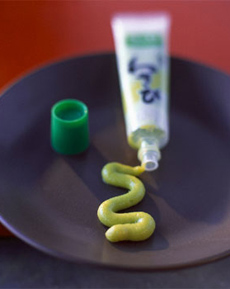Different MustardMustard Glossary Page 5: Pick A Different MustardH, I, J, K & L This is Page 5 of a seven-page mustard glossary. Instead of the same old, same old, pick a different mustard. To visit other pages, click on the black links below. If you’d like to suggest additional words for inclusion, click here. See all of our delicious food glossaries.
HERB MUSTARDChive, parsley, watercress and other herbs are added to mustard for both flavor and color. |
||
HONEY MUSTARDA sweet mustard made by adding honey to a base mustard. It can be bought commercially, or made at home by mixing the two ingredients. It is often used as a dip for pretzels and as a sweet base for hors d’oeuvres. HOT MUSTARDThere are three varieties of mustard seed. The white (also called yellow) mustard seed (Brassica alba) produces a somewhat hot and tangy mustard, but the black (Brassica nigra) and brown (Brassica juncea) varieties are much more hot and pungent, carrying the heat “up the nose” and capable of making eyes water. Chinese mustard is made from the stronger brown mustard seeds, as is Dijon mustard and Colman’s mustard. The mustard seeds themselves are not hot or pungent until they are cracked or ground and mixed with a cold liquid, which effects a chemical reaction between two compounds, myrosin and sinigrin, and creates the hot mustard oil.
|
 Honey can be added to any type of mustard, such as Maille’s Dijon mustard, above. In fact, you can add a spoonful of honey—or a noncaloric sweetener—to a standard jar of mustard. |
|
HORSERADISH MUSTARDA zesty mustard made by adding honey to a base mustard. It can be bought commercially or made at home by mixing the two ingredients. It is served with roasts and sandwiches; and added to beef dishes, stews, and casseroles. You can buy it online. |
||
JAPANESE MUSTARD or WASABI MUSTARD
|
 Honey can be added to any type of mustard, such as Maille’s Dijon mustard, above. In fact, you can add a spoonful of honey—Photo courtesy Newspaper.li. |
|
|
Continue To Page 6: Mustard Types Beginning With M |
||
© Copyright 2005-2026 Lifestyle Direct, Inc. All rights reserved. All images are copyrighted to their respective owners.